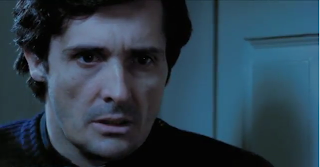Jason Miller received his only Oscar nomination for portraying Father Damien Karras in The Exorcist.
Jason Miller although in the supporting category here could really have been placed in lead considering he most certainly is the male lead of the film, I do not mind his supporting placement all that much though, since there are good amount of scenes that do not have him in it nor do the involve him. Karras though is a pivotal character of the film as he has a personal journey that is given a good deal of time that coincides with Chris Macneil (Ellen Burstyn) coming to the conclusion that her daughter Regan (Linda Blair) is in fact possessed by a demon rather that having a psychological problem.
For most of the film Miller's performance is an intensely quiet and subtle performance. His early scenes depict his problems dealing with the sickness and eventual death of his mother. It actually could have been very easy to have overplayed these moments but Miller is more effective by showing that the death of his mother troubles Karras greatly. The sadness and loss of faith in Karras is never portrayed in some huge outcry in his performance rather it is something deeper which Miller portrays in a very haunting way.
Karras though is forced to face his duty as a priest and his faith with the idea of the Exorcism and the possessed girl. Miller is terrific in his first scene with the demon as he at first is rather skeptical of the idea of someone actualyl being possessed by a demon. A scene like this frankly could have gone all wrong if the one reacting to the demonically possessed girl overacted at all, but Miller is deadly serious and realistic the entire time.
Miller continues to be effective and powerful in the pivotal final moments during the actual exorcism scenes. Miller is able to convey Damien's fear, and disbelief throughout the scene. Through each different attempt to get at him by the demon, Miller is able to honestly convey the brutality of the entire scene both emotionally and physically as the demon constantly wears him down. Miller through his realistic depiction is able to realize fully the horror of the scene.
Miller though realizes Damien courage and anger of the film. Miller is able to bring the power of the final scene extremely well showing Damien determination and strength perfectly. Miller gives a very powerful performance that is essential to the film, as Karras' transformation to uncertainty to determination is pivotal to the climax as well as his ability to bring realism to each of his scenes. Miller meets all of the challenges to his role, and succeeds completely with Damien.
Jason Miller although in the supporting category here could really have been placed in lead considering he most certainly is the male lead of the film, I do not mind his supporting placement all that much though, since there are good amount of scenes that do not have him in it nor do the involve him. Karras though is a pivotal character of the film as he has a personal journey that is given a good deal of time that coincides with Chris Macneil (Ellen Burstyn) coming to the conclusion that her daughter Regan (Linda Blair) is in fact possessed by a demon rather that having a psychological problem.
For most of the film Miller's performance is an intensely quiet and subtle performance. His early scenes depict his problems dealing with the sickness and eventual death of his mother. It actually could have been very easy to have overplayed these moments but Miller is more effective by showing that the death of his mother troubles Karras greatly. The sadness and loss of faith in Karras is never portrayed in some huge outcry in his performance rather it is something deeper which Miller portrays in a very haunting way.
Karras though is forced to face his duty as a priest and his faith with the idea of the Exorcism and the possessed girl. Miller is terrific in his first scene with the demon as he at first is rather skeptical of the idea of someone actualyl being possessed by a demon. A scene like this frankly could have gone all wrong if the one reacting to the demonically possessed girl overacted at all, but Miller is deadly serious and realistic the entire time.
Miller continues to be effective and powerful in the pivotal final moments during the actual exorcism scenes. Miller is able to convey Damien's fear, and disbelief throughout the scene. Through each different attempt to get at him by the demon, Miller is able to honestly convey the brutality of the entire scene both emotionally and physically as the demon constantly wears him down. Miller through his realistic depiction is able to realize fully the horror of the scene.
Miller though realizes Damien courage and anger of the film. Miller is able to bring the power of the final scene extremely well showing Damien determination and strength perfectly. Miller gives a very powerful performance that is essential to the film, as Karras' transformation to uncertainty to determination is pivotal to the climax as well as his ability to bring realism to each of his scenes. Miller meets all of the challenges to his role, and succeeds completely with Damien.
































































